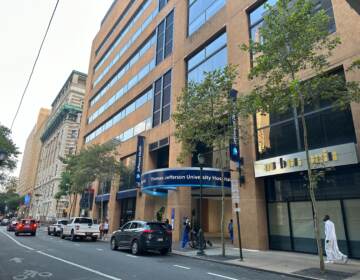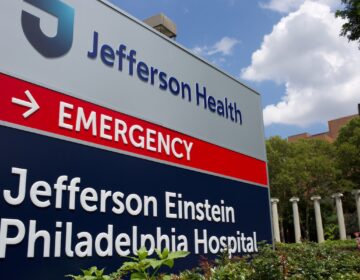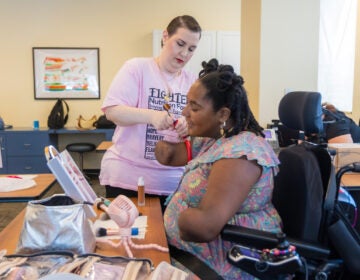Jefferson Health merger with Lehigh Valley Health Network would make it Philly’s largest employer, with a 30-hospital network
The proposed deal between Jefferson Health and Lehigh Valley Health Network could close by the end of 2024, according to a joint announcement from the hospital systems.
Listen 1:06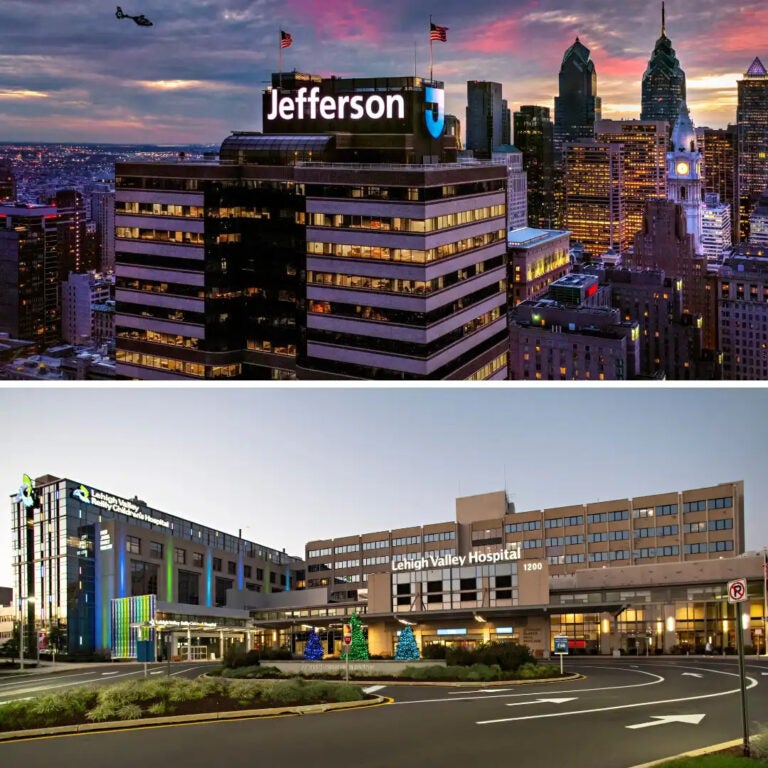
Philadelphia-based Jefferson Health is expected to combine with Allentown-based Lehigh Valley Health Network in a deal expected to close by the end of 2024. (Courtesy of Jefferson Health)
From Philly and the Pa. suburbs to South Jersey and Delaware, what would you like WHYY News to cover? Let us know!
If a proposed deal between Jefferson Health and Lehigh Valley Health Network is finalized, the combined entity — not yet formally named but referred to as the “Jefferson Enterprise” — would become the largest employer in the Philadelphia region.
The nonprofit hospital systems signed a non-binding letter of intent to “create a leading integrated care delivery [health] system,” according to a joint announcement released on Tuesday.
Philadelphia-based Jefferson Health, which includes Thomas Jefferson University and 17 hospitals, already has 42,000 employees across the region and is the second largest employer, which includes Jefferson Health Plans.
Allentown-based Lehigh Valley Health Network, which includes 13 hospital campuses, has 20,000 employees across the region.
If the two health care providers combine, the integrated health care system would control 30 hospitals and employ 62,000 workers.
That would outpace the University of Pennsylvania Health System as the current largest employer, with roughly 51,300 workers in the Philadelphia region.
The proposed Jefferson Health combined entity would include: Thomas Jefferson University Hospital in Center City, Philadelphia, Abington-Jefferson Health, Jefferson Health Northeast, Jefferson Health New Jersey, the Einstein Healthcare Network, and Magee Rehabilitation Hospital. Additionally, it would have four campuses in Allentown, two more in Bethlehem and Pottsville, and span to Easton, East Stroudsburg, Hazleton, Dickson City, and Lehighton.
Jefferson Health already generated about $9.7 billion of revenue during its fiscal year in 2023 that ended June 30 – albeit with an operating loss of $78.5 million.
Lehigh Valley Health Network produced about $4.1 billion in revenue during its fiscal year in 2023 that ended June 30 — with about $10.4 million in the black.
If the two entities were combined during the last fiscal year, it would generate about $13.8 billion in revenue but still be in the red in terms of an operating loss.
But it’s not a done deal – yet. Officials said in a news release that a final deal is expected to be signed by the end of 2024. The potential deal is still subject to internal negotiation and any required regulatory approvals.
Jefferson Health officials said in a news release that the move creates a nonprofit health system and research university with national recognition.
The future board of trustees, which oversees the executives, would include both Lehigh Valley and Jefferson Health board members.
After the proposed deal closes, Jefferson Health’s CEO, Dr. Joseph Cacchione, would remain the top brass of Jefferson Enterprise.
“With our combined network of resources and sites of care, managed care expertise, education, and research capabilities — we will have the ability to make significant improvements to health outcomes and address health disparities in this region,” Dr. Cacchione said in a news release.
Lehigh Valley Health Network’s CEO Brian Nester is expected to become executive vice president and chief operating officer and president — and report directly to Jefferson Health’s CEO.
“In Jefferson, we have found an ideal partner that shares our culture and commitment to excellence in clinical care and a learning environment, and that has done a fabulous job in establishing a highly successful health plan with a sharp focus on the well-being of Medicaid and Medicare beneficiaries,” Nester said in a news release.
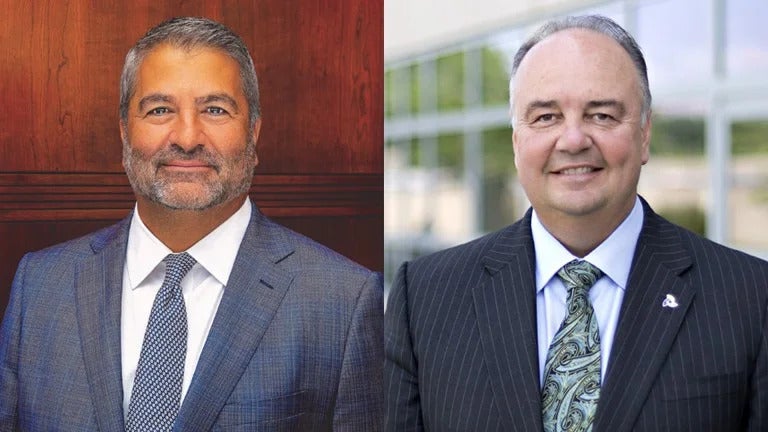
The health care systems touted that the combination would reduce the cost of health care, and offer a massive health care network with more than 700 sites across eastern Pennsylvania and South Jersey, which includes many primary care doctors. Thomas Jefferson University’s academic programs would have access to more clinical training as well.
The deal would enable the combined health system “sustainable cash flow and improved financial stability,” which would allow the organization to invest in more treatments through research and development.
In the meantime, both institutions will operate as independent organizations.
“The parties are committed to ensuring the patients and communities they serve continue to have access to exceptional care from their providers during completion of this process,” according to a statement.
The Hospital and Healthsystem Association of Pennsylvania, an advocacy organization for health care institutions statewide, commissioned some research released about a year ago detailing challenges in the market in terms of profitability.
The first two years of the COVID-19 pandemic were not as financially draining as 2022, because providers were tackling staffing shortages, higher labor costs, supply chain issues, inflation, rising interest rates on debt, and global markets in flux, according to the Analysis of the Current Challenges on Pennsylvania Hospitals report.
“This sentiment was overwhelmingly conveyed in interviews with leaders representing 10 hospitals and health systems across Pennsylvania. Many of these challenges are not merely transitory but likely represent a new normal,” according to the report.
Jefferson Health saw a $78.5 million loss from operations for the fiscal year ending June 30, according to financial documents shared with bondholders. That’s an improvement from $125.8 million in the red in June 2022.

By Sept. 30, Jefferson Health was $48 million dollars in the red for the quarter, which shows a narrowing loss. That’s compared to $84 million dollars in losses during the quarter ending September 2022.
Operating revenue was up nearly 6%, but expenses were also nearly 4% higher at Jefferson Health — or roughly $125 million and about $90 million, respectively — as of Sept. 30.
One major project in the works is a $762 million dollar Honickman Center at 11th and Chestnut Streets in Center City — about $66 million has been spent during the third quarter this year.
The next bond report, which would have more information about Jefferson Health’s financials, is expected to be released by the end of the year.
WHYY is your source for fact-based, in-depth journalism and information. As a nonprofit organization, we rely on financial support from readers like you. Please give today.



